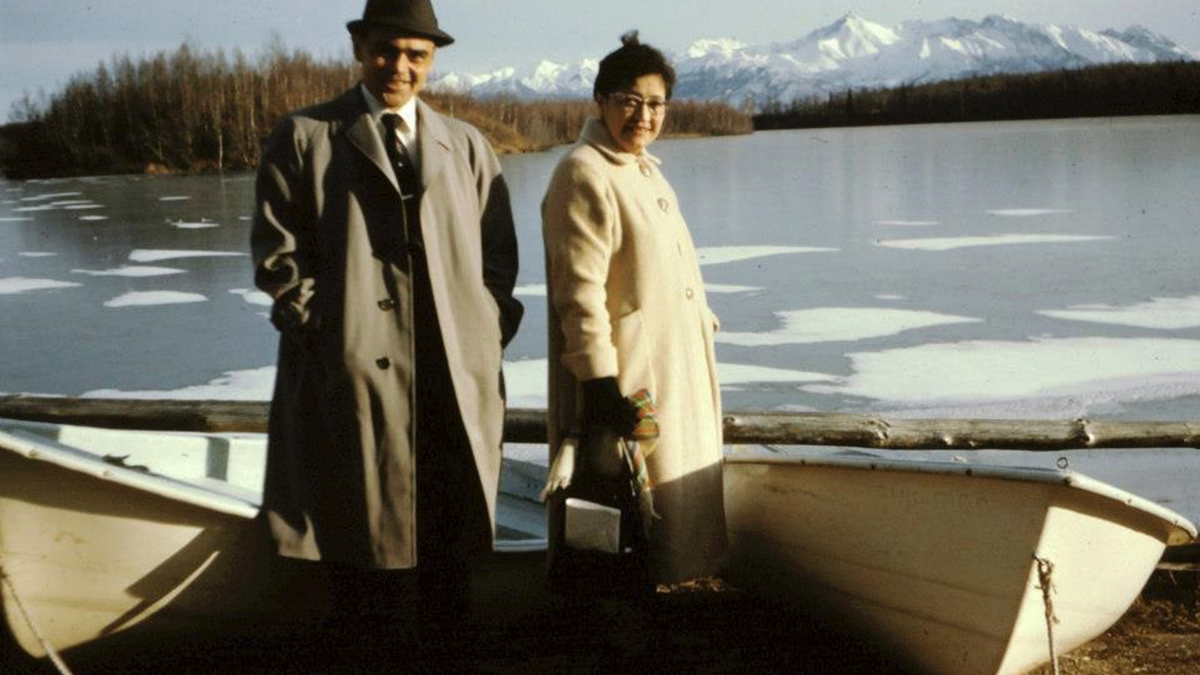
This undated photo provided by relatives shows the late Army veteran Richard Bean Sr. of Hoonah, Alaska and his wife Edith. Bean was among five long-deceased men who are being hailed by the state in March 2019 for their life-saving efforts during World War II for using their Native language to help the military outsmart the Japanese with Tlingit codes they could not break. (Family of Richard Bean Sr. via AP)
ANCHORAGE, Alaska – Army veteran Richard Bean Sr. died without anyone knowing that he and four other long-deceased Alaska Natives had used their Tlingit language to outsmart the Japanese during World War II.
Now, they are finally being hailed in their home state for their lifesaving efforts as servicemen.
Earlier this month, legislators passed a formal citation honoring the Tlingit Code Talkers. State flags were flown at half-staff and later presented to the men's families.
Bean and the others had been forbidden to speak Tlingit as schoolchildren in their southeast Alaska villages. Later, they used it to provide the military with unbreakable codes, as did their more well-known peers, Navajo Code Talkers.
The language of the Alaska Natives had been suppressed by missionaries and teachers trying to "civilize" them, said Rosita Worl, president of the Sealaska Heritage Institute. The Juneau nonprofit works to preserve and enhance the cultures of southeast Alaska's Tlingit, Haida and Tsimshian tribes.
Punishments for students who spoke Tlingit included having their mouths washed out with soap and their hands struck with rulers, Worl said.
"We're finally ecstatic that there is this recognition that our people served this country, even served this country that wasn't always good to them," she said.
The men's contributions went undisclosed for decades because the U.S. military had kept the unbroken codes secret in case they were needed in future wars.
"Their orders were not to talk about it," Ozzie Sheakley, an Army veteran and Tlingit leader, said about the five Alaska Natives. "They took those orders seriously."
Even their closest relatives had no clue about the wartime endeavors of Richard Bean Sr. of Hoonah and Robert "Jeff" David Sr. of Haines; Sitka brothers and Navy men Mark Jacobs Jr. and Harvey Jacobs; and Sitka resident George Lewis Jr., who served in the Army.
Bean's wife died before Congress posthumously recognized the men. His 85-year-old nephew, Ron Williams, never knew either, even though the two were close.
Williams said there was only one hint. His uncle told him a platoon leader had overheard him speaking Tlingit with Jeff David while the two served together in the Philippines. They were in the same company but different platoons.
The Army official asked how the men would like to handle communications then gave each a walkie-talkie.
That was all Bean said, and Williams never pushed for more, sensing his uncle didn't want to talk about it. Richard Bean died in 1985.
"Even the guys that knew him all his life, you know, they didn't know what he did either because he never said anything about it," Williams said.
David never said anything about the wartime duties to his son, Jeff David Jr., either.
"He just said he was in special services," the son said.
The military declassified the Navajo Code Talker program in 1968. But it was decades before recognition came to the Tlingit servicemen, after the passage of the Code Talkers Recognition Act of 2008.
Sheakley, commander of the Southeast Alaska Native Veterans, got a call from Department of Defense officials.
They told him the five Alaskans had been identified as Code Talkers from the Tlingit tribe, along with others from 32 Lower-48 tribes. Soon they would get the recognition long afforded the Navajos, who made up the largest group of Code Talkers.
In 2013, Congress recognized the Code Talkers, who were posthumously awarded silver medals. Sheakley also received a Congressional Gold Medal on behalf of the entire Tlingit tribe.
Alaska state Rep. and Tlingit Vietnam veteran Bill Thomas thought state recognition would soon follow.
"I just waited and waited and waited," Thomas said. "I finally said, 'Hey, it's time to pay tribute to these men.'"
State lawmakers agreed after Thomas and the Sealaska Heritage Institute pushed the idea.
The role the men played in history was a stunning discovery for the family of George Lewis Jr.
His son, Ray Lewis, was born after the war and never knew his father was in the military.
"I'm very proud of it," Ray Lewis said of the new recognition. "My father was instrumental in saving a lot of lives out there."
___
Follow Rachel D'Oro at https://twitter.com/rdoro .









































